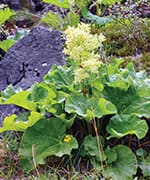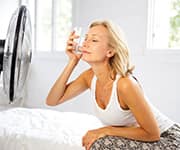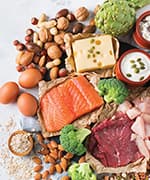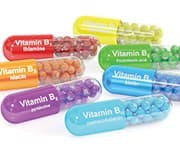Life Extension Magazine®
It starts around age 40. Some women feel a little “off,” while others experience significant changes in mood, energy, and stress.
This can signal the first stages of the hormonal rollercoaster that culminates in menopause.
Up to this point, women may experience any of 11 menopausal symptoms, including hot flashes, mood swings, sleep problems, and vaginal dryness.1
Many women want to avoid conventional hormone treatments.
Scientists have developed a hormone-free alternative that can reduce symptoms of hormonal imbalance and the related symptoms of menopause.
The unique ingredient, a patented Siberian rhubarb extract, has been shown to improve all 11 menopause symptoms.
Human studies show that Siberian rhubarb extract can reduce overall symptom severity by up to 83%.2
This Siberian rhubarb can now be found in a formula with essential B vitamins also shown to improve energy, mood, and stress.
Common Symptoms of Menopause
Most women go through menopause at around age 51.3
But any time after age 40, a decline in levels of the hormones estrogen and progesterone can begin to affect women physically and psychologically.3,4
Symptoms often include mood changes, low energy levels, and feelings of stress.3
Women may start experiencing these symptoms as early as in their mid-40s, a period known as perimenopause.5
During this time, regular menstrual cycling ceases and estrogen and progesterone levels sharply decrease.4
Experts have identified 11 common symptoms included in the Menopause Rating Scale. These symptoms, which may begin years before menopause, are:1
- Hot flashes and excessive sweating,
- Heart discomfort,
- Sleep problems,
- Joint and muscle discomfort,
- Depressive mood,
- Irritability,
- Anxiety,
- Physical and mental exhaustion,
- Sexual problems,
- Bladder issues, and
- Vaginal dryness.
For women who prefer to avoid hormone treatments, there’s an alternative solution.
Scientists developed a hormone-free formula for women over 40 that combines a patented Siberian rhubarb root extract with eight essential B vitamins.
The Siberian rhubarb has been found to counteract all menopause symptoms while B vitamins additionally help improve energy and mood.
How Siberian Rhubarb Works
The root of the Siberian rhubarb plant is rich in compounds that bind to the same receptors in cells to which estrogen normally binds.6 By doing this, they trigger beneficial estrogen-like effects throughout the body, helping to relieve menopause symptoms.
There are different kinds of estrogen receptors, and the difference is critical:
- Activating the ER-alpha receptor can produce undesirable growth in some tissues, including initiating and promoting cancer.7 Activation of this receptor by conventional hormone replacement therapy is believed to be the cause of many of the ill effects of this treatment.8
- Activating the ER-beta receptor promotes beneficial effects on skin, brain, metabolism, blood vessels, and other tissues—and relieves menopausal symptoms.8,9 The proprietary patented extract of Siberian rhubarb has been shown in preclinical studies to selectively activate ER-beta but not ER-alpha.6
Siberian rhubarb extract has been recommended by doctors since the 1950s for relieving menopause symptoms, and its use is further supported by numerous clinical studies in recent years.10
In Germany, 6.7 million doses are sold annually. Scientists have reviewed safety data collected there over two decades and concluded that the extract is extremely safe for long-term use.10
Improving Common Symptoms
To test its benefits, researchers conducted a series of human studies.
In all of the following studies, taking 4 mg of the patented Siberian rhubarb extract daily resulted in significant improvement in every one of the 11 common menopause symptoms.2,11-13
- In a clinical trial of symptomatic perimenopausal women, taking Siberian rhubarb extract significantly reduced the number and severity of hot flashes within just one month. After three months, it led to a 54% reduction in overall severity of symptoms on the Menopause Rating Scale.11
- After using the extract for one year, women who continued to take the product had a remarkable 83% reduction in overall severity of symptoms. These improvements weremaintained in the women who continued taking Siberian rhubarb for a second year.2
- In another study of perimenopausal women, taking Siberian rhubarb extract for just 12 weeks led to a reduction in daily hot flashes from a median of 12 to just two, an astonishing 83% decline.13
- An observational study found that 56% of symptomatic perimenopausal or postmenopausal women who took Siberian rhubarb for six months reported major improvements, with pronounced improvements in hot flashes, sleep problems, and irritability.12
Compelling Clinical Data
Clinical trials demonstrate consistent findings in response to daily use of Siberian rhubarb extract.
Some of the most dramatic benefits include:
- A decrease in the severity of sleep problems up to 69%.2,13
- An up to 67% reduction in urogenital symptoms,2 which include bladder problems (such as incontinence or difficulty urinating), vaginal dryness, and sexual problems (including loss of sexual desire).14
- An average 58% improvement in physical and mental exhaustion after just three months and an average 73% improvement in feelings of exhaustion after a year.2
- A reduction in heart discomfort like palpitations by as much as 60% in three months.2,13
- Improvements in joint and muscle discomfort by up to 50%.2,13
- A 66% reduction in total anxiety scores, on a recognized scale, after three months.15
What you need to know
Relief for Menopause Symptoms and More
- Perimenopause and menopause are marked by 11 common symptoms, including hot flashes, irritability, bladder issues, and sexual problems.
- In addition, some women over 40 begin noticing hormone-related symptoms like mood problems, low energy, and feelings of stress.
- Human studies show that taking 4 mg of Siberian rhubarb extract provides relief from all 11 menopause symptoms and reduces overall symptom severity by up to 83%.
- Research has also shown that B vitamins can improve mood, energy, and stress symptoms.
- Combining all essential B vitamins with Siberian rhubarb provides an alternative to conventional hormone therapy to address a broad range of symptoms experienced by women over 40.
Each B Vitamin Supports a Vital Function
In addition to improving symptoms relating to mood, energy, and stress, B vitamins support many vital body functions.17 Here are just a few:
- B1 (thiamine) helps convert glucose, proteins, and lipids into energy, playing an essential role in metabolism.24
- B2 (riboflavin) also helps convert nutrients into energy and provides antioxidant activity.25
- B3 (niacin) plays a role in DNA repair, cellular signaling, and metabolism.26
- B5 (pantothenic acid) helps produce hormones and converts proteins, carbohydrates, and fatty acids to energy.27
- B6 (pyridoxine) helps metabolize amino acids and supports neurotransmitters and red blood cells’ production.28
- B7 (biotin) regulates gene expression and is required for metabolism of fat and carbohydrates.29 It is also important for healthy hair and skin.30
- B9 (folic acid or, for superior absorption, 5-MTHF31) is vital for cell growth, amino acid metabolism, production of red and white blood cells, healthy cell division, and proper fetal growth and development.32-35
- B12 (cobalamin or methylcobalamin) is important for neurological function, development of red blood cells, production of DNA, and promoting healthy homocysteine levels.36-38
Benefits of B Vitamins
To provide additional benefits for women over 40, scientists combined this Siberian rhubarb extract with eight essential B vitamins:
- B1 (thiamine),
- B2 (riboflavin),
- B3 (niacin),
- B5 (pantothenic acid),
- B6 (pyridoxine),
- B7 (biotin),
- B9 (folic acid), and
- B12 (cobalamin).
These vitamins are needed to help the body carry out necessary daily functions, including protein, fat, and carbohydrate metabolism, DNA and RNA synthesis, red blood cell production, and neurotransmitter metabolism.16,17
B vitamins also assist in maintaining the function of the brain and nervous system and have been shown in numerous studies to reduce symptoms that include low energy and fatigue, mood swings, and stress, and improve mental well-being.18,19
Deficiencies in B vitamins may become increasingly common with aging due to declining food intake, medication interactions, and poor gastrointestinal absorption of nutrients.20 Direct oral supplementation can correct these deficiencies.
Boosting Energy and Mood
B vitamins work together and are essential for healthy brain function and energy metabolism.16
A review and meta-analysis of randomized controlled trials revealed that intake of different B vitamins was associated with reduced stress symptoms and may benefit mood in healthy and at-risk individuals.21
An observational study following 3,503 older adults for an average of more than seven years found that higher intakes of vitamin B6 and vitamin B12 were associated with a lower likelihood of depression.22
And a placebo-controlled study of healthy older women found that taking vitamin B1 daily led to a 69% improvement in general well-being and a 78% decrease in fatigue in just six weeks.23
Combining B vitamins with Siberian rhubarb extract may provide greater relief for women over 40 suffering from symptoms like fatigue and anxiety.
Siberian Rhubarb Improves Depressive Symptoms
In a clinical study, perimenopausal women with depressive mood symptoms had the following improvements after taking Siberian rhubarb extract.15
Siberian Rhubarb |
Placebo |
|
Patients with remission of depression symptoms |
30.2% |
1.8% |
Patients with improvement of symptoms |
60.4% |
23.6% |
Patients with no change in symptoms |
9.4% |
69.1% |
Summary
After age 40, many women begin to suffer from perimenopausal symptoms of low energy, mood problems, and feelings of stress.
As women approach menopause, most also experience some of the 11 common menopausal symptoms, including hot flashes, irritability, and sexual problems.
Multiple human studies show that 4 mg of Siberian rhubarb root extract provides safe, effective relief of all these common menopausal symptoms.
Scientists have developed a formula that includes eight essential B vitamins combined with Siberian rhubarb extract for women seeking hormone-free benefits after age 40.
If you have any questions on the scientific content of this article, please call a Life Extension Wellness Specialist at 1-866-864-3027.
Not All Extracts are the Same
Only the clinically studied form of Siberian rhubarb extract has been shown to relieve 11 symptoms of menopause. These are extracts that have been standardized to more than 54% rhaponticin and more than 27% desoxyrhaponticin.
References
- Blumel JE, Arteaga E, Parra J, et al. Decision-making for the treatment of climacteric symptoms using the Menopause Rating Scale. Maturitas. 2018 May;111:15-9.
- Hasper I, Ventskovskiy BM, Rettenberger R, et al. Long-term efficacy and safety of the special extract ERr 731 of Rheum rhaponticum in perimenopausal women with menopausal symptoms. Menopause. 2009 Jan-Feb;16(1):117-31.
- Marlatt KL, Beyl RA, Redman LM. A qualitative assessment of health behaviors and experiences during menopause: A cross-sectional, observational study. Maturitas. 2018 Oct;116:36-42.
- O’Connor KA, Ferrell R, Brindle E, et al. Progesterone and ovulation across stages of the transition to menopause. Menopause. 2009 Nov-Dec;16(6):1178-87.
- Available at: https://my.clevelandclinic.org/health/diseases/21608-perimenopause. Accessed March 16, 2022.
- Wober J, Moller F, Richter T, et al. Activation of estrogen receptor-beta by a special extract of Rheum rhaponticum (ERr 731), its aglycones and structurally related compounds. J Steroid Biochem Mol Biol. 2007 Nov-Dec;107(3-5):191-201.
- Caldon CE. Estrogen signaling and the DNA damage response in hormone dependent breast cancers. Front Oncol. 2014;4:106.
- Paterni I, Granchi C, Katzenellenbogen JA, et al. Estrogen receptors alpha (ERalpha) and beta (ERbeta): subtype-selective ligands and clinical potential. Steroids. 2014 Nov;90:13-29.
- Thornton MJ, Taylor AH, Mulligan K, et al. The distribution of estrogen receptor beta is distinct to that of estrogen receptor alpha and the androgen receptor in human skin and the pilosebaceous unit. J Investig Dermatol Symp Proc. 2003 Jun;8(1):100-3.
- Chang JL, Montalto MB, Heger PW, et al. Rheum rhaponticum Extract (ERr 731): Postmarketing Data on Safety Surveillance and Consumer Complaints. Integr Med (Encinitas). 2016 Jun;15(3):34-9.
- Heger M, Ventskovskiy BM, Borzenko I, et al. Efficacy and safety of a special extract of Rheum rhaponticum (ERr 731) in perimenopausal women with climacteric complaints: a 12-week randomized, double-blind, placebo-controlled trial. Menopause. 2006 Sep-Oct;13(5):744-59.
- Kaszkin-Bettag M, Beck S, Richardson A, et al. Efficacy of the special extract ERr 731 from rhapontic rhubarb for menopausal complaints: a 6-month open observational study. Altern Ther Health Med. 2008 Nov-Dec;14(6):32-8.
- Kaszkin-Bettag M, Ventskovskiy BM, Solskyy S, et al. Confirmation of the efficacy of ERr 731 in perimenopausal women with menopausal symptoms. Altern Ther Health Med. 2009 Jan-Feb;15(1):24-34.
- Khatoon A, Husain S, Husain S, et al. An Overview of Menopausal Symptoms Using the Menopause Rating Scale in a Tertiary Care Center. J Midlife Health. 2018 Jul-Sep;9(3):150-4.
- Kaszkin-Bettag M, Ventskovskiy BM, Kravchenko A, et al. The special extract ERr 731 of the roots of Rheum rhaponticum decreases anxiety and improves health state and general well-being in perimenopausal women. Menopause. 2007 Mar-Apr;14(2):270-83.
- Kennedy DO. B Vitamins and the Brain: Mechanisms, Dose and Efficacy--A Review. Nutrients. 2016 Jan 27;8(2):68.
- Available at: https://www.ncbi.nlm.nih.gov/books/NBK538510/. Accessed March 11, 2022.
- De Souza MC, Walker AF, Robinson PA, et al. A synergistic effect of a daily supplement for 1 month of 200 mg magnesium plus 50 mg vitamin B6 for the relief of anxiety-related premenstrual symptoms: a randomized, double-blind, crossover study. J Womens Health Gend Based Med. 2000 Mar;9(2):131-9.
- Milart P, Wozniakowska E, Wrona W. Selected vitamins and quality of life in menopausal women. Prz Menopauzalny. 2018 Dec;17(4):175-9.
- Kaur D, Rasane P, Singh J, et al. Nutritional Interventions for Elderly and Considerations for the Development of Geriatric Foods. Curr Aging Sci. 2019;12(1):15-27.
- Young LM, Pipingas A, White DJ, et al. A Systematic Review and Meta-Analysis of B Vitamin Supplementation on Depressive Symptoms, Anxiety, and Stress: Effects on Healthy and ‘At-Risk’ Individuals. Nutrients. 2019;11(9):2232.
- Skarupski KA, Tangney C, Li H, et al. Longitudinal association of vitamin B-6, folate, and vitamin B-12 with depressive symptoms among older adults over time. Am J Clin Nutr. 2010 Aug;92(2):330-5.
- Smidt LJ, Cremin FM, Grivetti LE, et al. Influence of thiamin supplementation on the health and general well-being of an elderly Irish population with marginal thiamin deficiency. J Gerontol. 1991 Jan;46(1):M16-22.
- Available at: https://www.ncbi.nlm.nih.gov/books/NBK482360/. Accessed March 11, 2022.
- Thakur K, Tomar SK, Singh AK, et al. Riboflavin and health: A review of recent human research. Crit Rev Food Sci Nutr. 2017 Nov 22;57(17):3650-60.
- Meyer-Ficca M, Kirkland JB. Niacin. Adv Nutr. 2016 May;7(3):556-8.
- Available at: https://pubchem.ncbi.nlm.nih.gov/compound/pantothenic_acid. Accessed March 11, 2022.
- Available at: https://pubchem.ncbi.nlm.nih.gov/compound/pyridoxine. Accessed March 11, 2022.
- Zempleni J, Wijeratne SS, Hassan YI. Biotin. Biofactors. 2009 Jan-Feb;35(1):36-46.
- Trueb RM. Serum Biotin Levels in Women Complaining of Hair Loss. Int J Trichology. 2016 Apr-Jun;8(2):73-7.
- Scaglione F, Panzavolta G. Folate, folic acid and 5-methyltetrahydrofolate are not the same thing. Xenobiotica. 2014 May;44(5):480-8.
- Stanger O. Physiology of folic acid in health and disease. Curr Drug Metab. 2002 Apr;3(2):211-23.
- Available at: https://www.ncbi.nlm.nih.gov/books/NBK114318. Accessed March 10, 2022.
- Quinlivan EP, McPartlin J, McNulty H, et al. Importance of both folic acid and vitamin B12 in reduction of risk of vascular disease. Lancet. 2002 Jan 19;359(9302):227-8.
- Kim MW, Ahn KH, Ryu KJ, et al. Preventive effects of folic acid supplementation on adverse maternal and fetal outcomes. PLoS One. 2014;9(5):e97273.
- O’Leary F, Samman S. Vitamin B12 in health and disease. Nutrients. 2010 Mar;2(3):299-316.
- Nohr D, Biesalski HK. Vitamin B12. Reference Module in Food Science: Elsevier; 2016.
- Available at: https://www.ncbi.nlm.nih.gov/books/NBK114302/. Accessed March 10, 2022.







